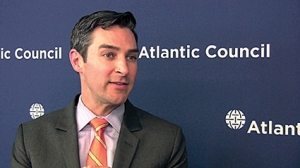Wilson: No dramatic changes for Georgia at Warsaw Summit
To discuss the NATO-Georgia Partnership and the upcoming summit in Warsaw, Voice of America Georgian Service sat down with Damon Wilson, Executive Vice-President of the US Atlantic Council for an exclusive interview in Washington DC.
What’s the ultimate goal of the 10th Annual Georgia Defense and Security Conference (GDSC) and of Georgia’s partnership with the Alliance?
We aim to continue to anchor Georgia in the trans-Atlantic security community by building a community of influence around those knowledgeable of, educated and supportive of the US-Georgian relationship and Georgia’s relationship with NATO allies.
Up to 1,300 troops from the US, Georgia and UK launched joint military exercises, Noble Partner, outside Tbilisi on May 11. What is the prominence of such joint exercises for Georgia?
The US and Georgia have had a long military relationship, a long relationship of training, partnering and securing cooperation. And in some respects each chapter of our security relationship is focused on a particular objective, from Pankisi Gorge to pairing in Afghanistan deployments. This has led to a sustained continued US military security commitment and engagement in Georgia, which I think is constructive for stability and security in the region.
Some publicly state that such drills create “a serious threat” to Georgia
We don’t do this on our own, we don’t do this because we want to; we do it simply because there is a strong demand from Tbilisi, demand seen across Georgian governments, to see the US and NATO allies exercising, training, and cooperating with the Georgian military- this has been a consistent message coming from Georgian leaders.
There are voices that oppose and voices that say what we are doing is provocative, as much in Georgian parliament as in US political classes. I believe it’s a false argument. The fact that a country has to take care of its own security is not provocative. The more a country is able to stand on its own, have defense capabilities and be able to be a serious actor is a demonstration, I think, of a stabilizing factor in the region, and this relationship contributes to that.
How do the ambiguous comments coming from different branches of the Georgian government affect Georgia’s strategic partnerships?
We wouldn’t be there without the support or invitation of the government- that is not how the US deals with its allies and partners. This is not a relationship, like that of the Soviet Union, based on coercion, intimidation, or tactics that Russians pursue today.
It is clear that the overwhelming majority of Georgian people and the responsible Georgian political actors are supportive of the US-Georgian relationship. In fact, what we hear is that we want more United States; we want stronger commitment. There are reservations on both sides that we could potentially be in a difficult period because there is a degree of ambiguity. There is ambiguity because the US and our NATO allies have not yet made a committed security guarantee to Georgia. I agree it’s a pretty strong argument. When you have clarity of security arrangements, everybody understands the rules of the game, and it’s a stabilizing factor. Right now, we are navigating this degree of uncertainty and I think these exercises in that regard serve as a stabilizing factor themselves.
The US Envoy to NATO recently said he sees no expansion of the Alliance in the near future. Has the US government changed its standpoint?
The position of the US government has not changed. It’s clear that US policy remains committed to the concept of an open door policy as well as the Bucharest statement that Georgia will be a member one day. That’s not going to change dramatically before Warsaw, but I think we’ll see continuing growth in the Georgia-NATO relationship, which is already incredibly robust.
I don’t think we’ve ever seen a country as far along as Georgia in building up a real substantial relationship with the Alliance before membership. That is a testament to Georgia’s commitment, and I think it really will begin to sway and convince the Alliance of the validity of what was done in Bucharest. Today, politically, we are not there yet and we aren’t going to see a dramatic change in that status come out of the Warsaw summit.
What will happen after the Summit?
What we’re going to see is the Alliance adopting a greater posture of deterrence, greater clarity, recognizing that the position Russia is taking right now as an adversary to the Alliance and therefore it will have to be deterred. However, it’s going to be a work in progress and work will need to be done to continue to draw Georgia into the Alliance- this, of course, will continue well after the Warsaw Summit.
Nana Sajaia, Voice of America/Georgian Service












